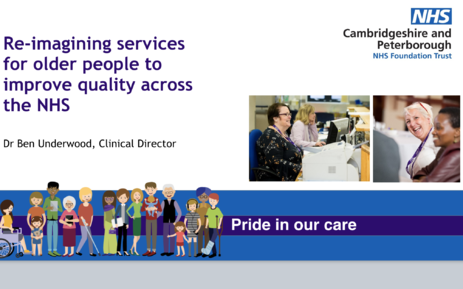Cambridgeshire has engaged in a bold experiment to unify provision of physical and mental healthcare for the elderly.
This model provides a potential solution to a number of the big problems facing the NHS including financial constraints, providing quality care to the complex frail elderly and the increasing pressure on acute trusts. It gives the opportunity to deliver high quality care that is preferred by patients at lower cost
Integrating mental and physical healthcare
Cambridgeshire and Peterborough NHS Foundation Trust
What was the problem?
Frail elderly patients often have multiple conditions that include mental health problems such as depression, delirium or dementia. Traditional healthcare models, particularly admission to acute hospitals, can bring harm as well as benefit for these patients. They may be cared for by several teams, with the result that communication and care may be fragmented. With numbers of such patients increasing, the system risked becoming overstretched, unaffordable and delivering suboptimal care.
What was the solution?
Mental and physical healthcare in the community is now commissioned from a single secondary care provider – Cambridgeshire and Peterborough NHS Foundation Trust. It had previously been the mental health trust for the county so had experience of moving from a mainly hospital-based model to community treatment. The trust now provides diverse services, including inpatient physical and mental healthcare, minor injury units, emergency community mental and physical healthcare response, district nursing and therapy, dietetics, speech and language therapy and many specialist teams. It has over 1 million patient contacts per year.

What were the challenges?
Staff were no strangers to change, so had to be persuaded that this one was necessary and could bring meaningful benefits. Those used to working in community trusts had concerns about being employed by a mental health trust. Some saw the change in ethos as challenging established methods of delivering care in general practice and local acute trusts.
What were the results?
The trust now provides all community teams, which it has brought together to allow patients to move easily between them. Any practitioner can now access any community healthcare – and increasingly, social care – that patients need. The trust is central to the sustainability and transformation partnership, designing and operating £12 million of new schemes to integrate physical and mental health and treat patients at home. Patients are pleased with the changes. One commented: “The best thing you have done for me is that I don’t have to go to hospital”.
What were the learning points?
It is possible to make such changes quickly and on a large scale – and mental health providers can lead them. Leadership, clear vision focused on patient benefit, a collective and collaborative approach and emphasis on psychological safety are all important. Integrating mental and physical health provided at home makes sense to patients and staff.
Next steps
Finding ways of working more closely with primary care and sustaining acute care providers’ support by significantly decreasing hospital attendance and admission.
Want to know more?
Powerpoint summary of the service innovation
Dr Ben Underwood, Clinical Director, [email protected]
